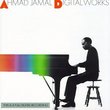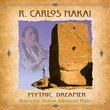| All Artists: Johann Sebastian Bach Title: Bach: Sonatas and Partitas, Vol. 1 Members Wishing: 0 Total Copies: 0 Label: Channel Classics Nl Release Date: 6/8/1999 Album Type: Import Genre: Classical Styles: Chamber Music, Historical Periods, Baroque (c.1600-1750), Instruments, Strings, Symphonies Number of Discs: 1 SwapaCD Credits: 1 UPC: 723385121985 |
Search - Johann Sebastian Bach :: Bach: Sonatas and Partitas, Vol. 1
 | Johann Sebastian Bach Bach: Sonatas and Partitas, Vol. 1 Genre: Classical
Raid a Bach lover's CD collection and you're sure to find at least one copy of the Cello Suites (and probably six or more if it's a real Bach lover). Like his other works for unaccompanied string instruments, the Sonatas ... more » |
Larger Image |
CD DetailsSynopsis
Amazon.com Essential Recording Raid a Bach lover's CD collection and you're sure to find at least one copy of the Cello Suites (and probably six or more if it's a real Bach lover). Like his other works for unaccompanied string instruments, the Sonatas and Partitas Bach composed for solo violin were long misunderstood as mere pedagogical exercises. Romantic composers attempted to "rescue" them with transcriptions for piano and the like (the vast, labyrinthine Chaconne from the Partita No. 2 still holds a place in the piano repertoire). But, as with Casals and the Cello Suites, the amazing eloquence of interpreters such as Arthur Grumiaux helped establish the significance of this music for solo violin as among the composer's exalted masterpieces. In her highly acclaimed account using a baroque violin with gut strings (from 1739, by the Genoan maker Pesarinius), English violinist Rachel Podger joins the top rank of Bach interpreters. She employs the latest insights of authentic-performance research but remains at the furthest remove from musicological stuffiness, expressing instead a living, breathing musicality that will stir you to the marrow. It takes very little for modern ears fattened on gushy vibrato and sentimental excess to adjust to Podger's beautifully restrained delivery--rather like the first minutes spent adjusting to Shakespearean English in a stage production of the bard. After that, the Baroque idiom sounds quite natural indeed. Podger wrings a fresh brand of opulence: in the engaging imagination of her ornamentations and in her rich sense of lines coming together and diverging, she spins a marvelous sonic fabric. Listen to the channels and currents she makes of that celebrated Chaconne in the Partita No. 2 and you won't need to hear it on the keyboard again. This is one of the most significant Bach interpretations available today--and you won't want to miss Podgers's follow-up second volume. --Thomas May Similarly Requested CDs
|
Member CD ReviewsReviewed on 12/12/2008... This is just stunningly good. Podger's recording of Bach's Sonatas and Partitas has received rave reviews from just about every critic, and is now widely considered to be the top recording of this work. Well deserved. Highly, HIGHLY recommended. 1 of 1 member(s) found this review helpful.
CD ReviewsAbout Time Andres Sender | N. CA, USA | 12/19/1999 (5 out of 5 stars) "I'd been hoping for a Podger recording of the solo works by Bach ever since hearing her on a few of the Palladian Ensemble CDs. I like the Kuijken recordings but Podger's very 'vocal' articulation and note-shaping made me hope for something I would like even more.I've been listening to this CD for several months now, and I find it to be more than I'd hoped.There is a sense of liquidity to Podger's playing that comes from both the minute agile sense of detail she can bring to the shape of a single note, and the consistent interconnectedness and flow which she preserves throughout the pieces, regardless of interpretive pushing and pulling or strong articulation. Her tone adds to the effect by being a little sweet, without being monochromatic.I am particularly happy with her interpretive shaping. There is always a kind of tug of war in any performance, between the essential character and pulse of the piece, and the esthetic exaggerations and accents which are used to 'bring it to life'. My favorite performing artists are the ones who seem most able to pull in both directions at the same time, working them together while maximizing the expressive tensions of the piece.A well-conceived interpretation rewards repeated listening with layer after layer of new discoveries and revelations; Rachel Podger's Bach is a series of integrated flowing gems cut with clarity and artistry to reveal structured and seemingly inexhaustible depths.Did I mention that I was a fan? :-)" A fine performance Matt Holcomb | Irvine, Ca USA | 09/07/1999 (5 out of 5 stars) "When listening to a piece for an unaccompanied solo instrument, the music's mood, the fluidity, the dynamic equilibrium, the evenness, rest in one mind interpreting, in one set of fingers playing, and it seems that either the performer can realize and interpret the composer's dream or he/she cannot. With Bach, these rules are exponentially compounded, as the solo instrument becomes a vehicle for a rich polyphonous composer to have a dialogue: a dialogue with the sounds of itself. This poses a problem for many players attempting to tackle Bach's works for solo instrument. Performances either tend to fall in slop and disaster, or they shine. Podger's performance is just short of being perfect. Her articulation is crisp and clean, that means no sloppy bow or fretmanship, and her sense of rhythm and tempo is balanced with the unity of the whole always kept sharply in focus. There are only a few places, and I say a few, that her focus slips, but they are most likely interpretive choices.Until Andrew Manze performs the sonatas and partitas, Rachael Podger's performance will rein as the finest period interpretation, if not the finest interpretation on the market. The second and concluding volume will be much anticipated."
|

 Track Listings (17) - Disc #1
Track Listings (17) - Disc #1






